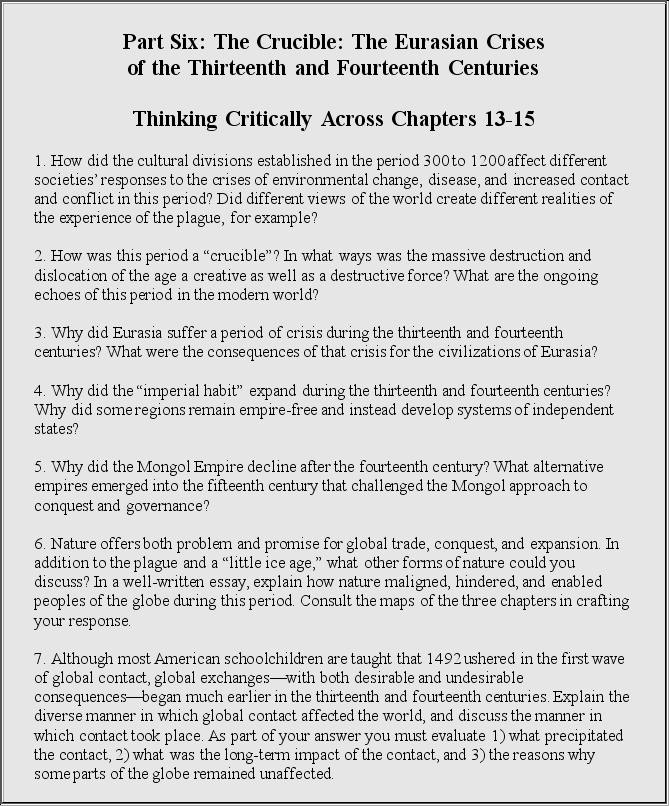Exam 15: Expanding Worlds: Recovery in the Late Fourteenth and Fifteenth Centuries
Exam 1: Out of the Ice: Peopling the Earth51 Questions
Exam 2: Out of the Mud: Farming and Herding After the Ice Age51 Questions
Exam 3: The Great River Valleys: Accelerating Change and Developing States54 Questions
Exam 4: A Succession of Civilizations: Ambition and Instability48 Questions
Exam 5: Rebuilding the World: Recoveries, New Initiatives, and Their Limits53 Questions
Exam 6: The Great Schools52 Questions
Exam 7: The Great Empires53 Questions
Exam 8: Postimperial Worlds: Problems of Empires in Eurasia and Africa, Ca 200 to 700 Ce53 Questions
Exam 9: The Rise of World Religions: Christianity, Islam, and Buddhism49 Questions
Exam 10: Remaking the World: Innovation and Renewal on Environmental Frontiers in the Late First Millenium49 Questions
Exam 11: Contending With Isolation: Ca 1000-120050 Questions
Exam 12: The Nomadic Frontiers: the Islamic World, Byzantium, and China, Ca 1000-120047 Questions
Exam 13: The World the Mongols Made53 Questions
Exam 14: The Revenge of Nature: Plague, Cold, and the Limits of Disaster in the Fourteenth Century51 Questions
Exam 15: Expanding Worlds: Recovery in the Late Fourteenth and Fifteenth Centuries54 Questions
Select questions type
What lasting consequences did humanism have on European Christianity?
(Multiple Choice)
4.9/5  (40)
(40)
In which of the following ways was Mwene Mutapa different from Ethiopia?
(Multiple Choice)
4.8/5  (41)
(41)
A key difference between Western European voyages of exploration and those carried out by China during the fifteenth century was that
(Multiple Choice)
4.7/5  (42)
(42)
Artists in the fifteenth- and sixteenth-century Italy were most likely to:
(Multiple Choice)
5.0/5  (32)
(32)
The voyages of Zheng He during the Ming Dynasty mark one of the most ambitious overseas adventures undertaken in the fifteenth century. Explain the purpose of these voyages, what was learned during them, and circumstances that led to a decision by Chinese leaders to bring them to a halt.

(Not Answered)
This question doesn't have any answer yet
European navigators were unable to reach the Indian Ocean until
(Multiple Choice)
4.9/5  (35)
(35)
One of the reasons European maritime empires developed relatively slowly is that
(Multiple Choice)
4.8/5  (39)
(39)
The power of the state increased in Western Europe largely because of improvements in
(Multiple Choice)
4.9/5  (41)
(41)
Financial backing for Christopher Columbus' first voyage across the Atlantic Ocean came from
(Multiple Choice)
4.8/5  (37)
(37)
Can Zheng He's voyages be understood as acts of imperialism? Explain why or why not.
(Essay)
4.8/5  (44)
(44)
Explain how the Inca empire became the world's fastest growing empire in the late fifteenth and early sixteenth century. What enabled the Incas to maintain control? How did environmental and climate variation support their extensive empire? When Inca society eventually collapsed, what important legacy did it leave?
(Essay)
4.8/5  (41)
(41)
Which of the following was an important source of wealth for the emerging Ethiopian empire?
(Multiple Choice)
4.8/5  (34)
(34)
Which of the following is NOT one of the consequences of Portuguese contact with the Kingdom of Kongo?
(Multiple Choice)
4.8/5  (33)
(33)
All of the following were consequences of the fall of Constantinople EXCEPT:
(Multiple Choice)
5.0/5  (30)
(30)
Compare and contrast the processes that led to the emergence of empires in East and West Africa.
(Essay)
4.8/5  (36)
(36)
How did the rise of nationalism and the state system drive European expansion?
(Essay)
4.9/5  (34)
(34)
Which of the following problems did the Aztec Empire share with the Inca Empire?
(Multiple Choice)
4.7/5  (33)
(33)
Compare and contrast the causes and limitations of expansion of the empires of Eurasia, Africa, and the Americas.
(Essay)
4.8/5  (34)
(34)
Explain the role of religion in Russian expansionism. How was Moscow a "Third Rome"? How did this compare to the role of religion in Ottoman expansion?
(Essay)
4.8/5  (35)
(35)
Showing 21 - 40 of 54
Filters
- Essay(0)
- Multiple Choice(0)
- Short Answer(0)
- True False(0)
- Matching(0)